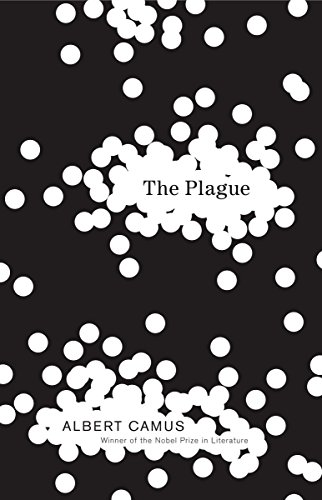
The Plague seems like an appropriate title of a book for a coronavirus-stricken world. Set in modern (1940s?) North Africa, this book reimagines a world where the plague mysteriously makes a recurrence. The work is told from the point of view of a doctor. As with COVID-19 paralyzing the world, the disease paralyzes an entire town for several seasons. Many die over many months.
This work provides moving portrayals of individual death and of massive death’s dehumanizing effect on human flourishing. Camus, as always, points us to an existential philosophy of choosing to seize the day despite evil. Even the deaths of a child and of one of the books heroes are cast in this light. The town eventually recovers, much as the world will recover from today’s infections. The world resumes much as it did post World War II; however, the world after has changed in so many ways.
In this work, the protagonist faces squarely the good and the evil that humans are capable of. Camus does not mince words in these portrayals. Much like with the Christian concept of original sin, all of us are guilty of murderous callousness towards our fellows. (In Camus’ day, he might have said that even enlightened and educated Germany turned towards fascism.) Nonetheless, goodness still flows from humanity, and this optimistic message is even borne in times of plague. The plague we all wrestle with is not only external (as in disease) but also internal (as in monstrous selfishness). There are no saints, only humans or “men” as Camus put it writing in a less gender-inclusive era.
This wrestling with evil is classic Camus. (There are some reports that such wrestling led him to convert to a neo-orthodox form of Christianity before his tragic death in a car accident in 1960.) Camus wrestled with why six million civilian Jews and large numbers of soldiers died in two massive wars in a twentieth century that opened with such promise. Of course, questions like these only provide uncomfortable answers. Nonetheless, Camus chooses – yes, chooses, in a demonstration of his existentialist philosophy – to focus upon the good brought out by these trials. Humans are not turned into saints by life. They – no, we – are shown to be petty and selfish over and over again. Nonetheless, we must deliberate and choose to bring out the good by our daily lives despite the plague’s pervasive presence.
In a contemporary environment where governments sometimes fail us and even the best of our fellows seem unsaintly, Camus’ message remains relevant. This work speaks against partisan bickering through small and limited ideologies, but to warm and open embrace of our common and frail humanity. It needs to be reread and reheard by new generations sixty years after Camus’ sudden death. Twenty years ago in college, I loved spending my spare time discovering this author. Today, I cherish his themes even more as they account for the mass of real life that I’ve lived. I wish that more would join me by contemplating his perspective.
The Plague
by Albert Camus
Copyright (c) 1948, 1975
Vintage International
ISBN13 9780679720218
Page Count: 308
Genre: Fiction, Philosophy
www.amazon.com